New Delhi – Israeli Prime Minister Benjamin Netanyahu provided crucial insights into the ongoing Netanyahu On Iran-Israel Conflict during a recent address to reporters, outlining the specific conditions under which military operations against Iran will cease. The Prime Minister’s statements shed light on Israel’s strategic approach to eliminating what he describes as existential threats posed by Iran’s nuclear and ballistic missile programs.
Clear Conditions for Ending Military Operations
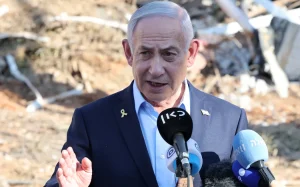
Netanyahu On Iran-Israel Conflict discussions have intensified as the Prime Minister articulated a measured approach to the ongoing military campaign. “We won’t pursue our actions beyond what is needed to achieve them, but we also won’t finish too soon,” Netanyahu stated, emphasizing Israel’s commitment to achieving specific strategic objectives without unnecessary escalation.
The Israeli leader’s comments regarding Netanyahu On Iran-Israel Conflict strategy reveal a calculated approach designed to avoid prolonged warfare while ensuring comprehensive elimination of perceived threats. “When the objectives are achieved, then the operation is complete and the fighting will stop,” he declared, providing a clear framework for understanding Israel’s military timeline.
Dual Threat Strategy: Nuclear and Ballistic Missiles
Central to Netanyahu On Iran-Israel Conflict planning is the identification of two primary threats requiring immediate attention. Netanyahu emphasized that Israel’s operation targets Iran’s nuclear capabilities and ballistic missile infrastructure as concrete dangers to Israeli security and regional stability.
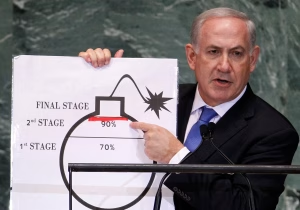
“I have no doubt that this is a regime that wants to wipe us out, and that’s why we embarked on this operation to eliminate the two concrete threats to our existence: the nuclear threat, the ballistic missile threat,” Netanyahu explained. This dual-focused approach underlies the current Netanyahu On Iran-Israel Conflict military strategy.
Also Read: Khamenei Threatens Israel While Ignoring Devastating US Strikes
The Prime Minister’s assessment of Netanyahu On Iran-Israel Conflict objectives suggests Israel views these threats as interconnected components of Iran’s broader strategic capabilities. By targeting both nuclear and missile programs simultaneously, Israel aims to comprehensively degrade Iran’s ability to project power across the region.
Significant Progress Toward Strategic Goals
Netanyahu’s latest statements on Netanyahu On Iran-Israel Conflict developments indicate substantial progress in achieving military objectives. “We are moving step by step towards achieving these goals. We are very, very close to completing them,” he announced, suggesting the operation may be nearing its intended conclusion.
The systematic approach described in Netanyahu On Iran-Israel Conflict briefings demonstrates Israel’s preference for measured escalation rather than overwhelming force. This methodology allows for careful assessment of operational effectiveness while maintaining flexibility to adjust tactics as circumstances evolve.
Progress reports on Netanyahu On Iran-Israel Conflict operations suggest Israeli forces have successfully targeted key infrastructure components critical to Iran’s strategic weapons programs. Netanyahu’s confidence in approaching completion indicates significant degradation of targeted capabilities.
Fordow Nuclear Facility Severely Damaged


A critical development in Netanyahu On Iran-Israel Conflict operations involves extensive damage to Iran’s Fordow nuclear facility. Netanyahu revealed that American bunker-buster bombs caused severe damage to this crucial uranium enrichment site, though complete assessment remains ongoing.
The targeting of Fordow represents a significant escalation in Netanyahu On Iran-Israel Conflict military actions, as this facility has been central to Iran’s uranium enrichment activities. The underground nature of Fordow has long made it a challenging target for conventional military operations.
Damage assessment from Netanyahu On Iran-Israel Conflict strikes against Fordow will likely determine the extent to which Iran’s nuclear program capabilities have been degraded. The facility’s destruction significantly impacts Iran’s ability to continue high-level uranium enrichment activities.
Intelligence on Enriched Uranium Stockpiles
Netanyahu’s comments on Netanyahu On Iran-Israel Conflict developments included references to detailed intelligence regarding Iran’s enriched uranium stockpiles. When questioned about the location of Iran’s 60% enriched uranium, the Prime Minister indicated comprehensive monitoring while declining to share specific details.
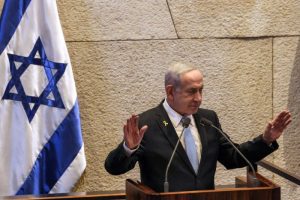

“We’ve been following that very closely. I can tell you that it’s an important component of a nuclear programme. It’s not the sole component. It’s not a sufficient component. But it is an important component and we have interesting intel on that,” Netanyahu stated regarding Netanyahu On Iran-Israel Conflict intelligence gathering.
The focus on enriched uranium in Netanyahu On Iran-Israel Conflict planning reflects understanding that Iran’s nuclear program depends on multiple components working together. Netanyahu’s acknowledgment of possessing detailed intelligence suggests Israel maintains comprehensive surveillance of Iranian nuclear activities.
Iran’s Nuclear Program Development
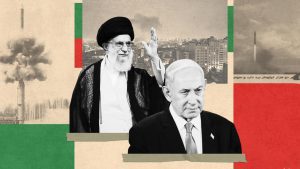

Netanyahu On Iran-Israel Conflict analysis reveals Iran’s significant advancement beyond internationally agreed uranium enrichment levels. Prior to Israeli strikes on June 13, Iran was enriching uranium to 60% purity, representing a substantial increase from the 3.67% limit established under the 2015 nuclear agreement.
The escalation in uranium enrichment that prompted Netanyahu On Iran-Israel Conflict military action demonstrates Iran’s progressive departure from international nuclear agreements. This 60% enrichment level brings Iran dangerously close to the 90% purity required for weapons-grade uranium.
Historical context of Netanyahu On Iran-Israel Conflict tensions shows Iran respected nuclear agreement limitations until 2019, one year after President Trump withdrew the United States from the deal in 2018. This timeline illustrates how diplomatic failures contributed to current military confrontations.
Avoiding War of Attrition
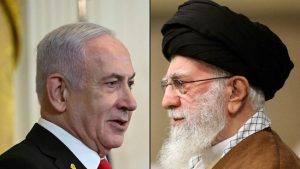

Netanyahu’s approach to Netanyahu On Iran-Israel Conflict operations emphasizes avoiding prolonged engagement that could develop into costly war of attrition. The Prime Minister promised measured action designed to achieve specific objectives without unnecessary expansion of military operations.
This strategic philosophy underlying Netanyahu On Iran-Israel Conflict planning reflects lessons learned from previous Middle Eastern conflicts where clear objectives and exit strategies proved crucial for successful military outcomes. Netanyahu’s commitment to avoiding premature conclusion while preventing overextension demonstrates sophisticated strategic thinking.
The balance sought in Netanyahu On Iran-Israel Conflict operations requires precise timing and comprehensive intelligence to ensure objectives are met without triggering broader regional escalation that could draw additional actors into the conflict.
Tehran’s Defensive Posture
Iran’s response to Netanyahu On Iran-Israel Conflict operations has been characterized by vows to defend itself “at all costs,” according to Netanyahu’s briefing. This defensive posture suggests Iran recognizes the severity of threats to its strategic capabilities while attempting to maintain deterrent credibility.
The Iranian reaction to Netanyahu On Iran-Israel Conflict military actions will likely influence the duration and intensity of Israeli operations. Tehran’s defensive capabilities and willingness to escalate remain key variables in determining how the current conflict develops.
Conclusion
Netanyahu On Iran-Israel Conflict statements provide unprecedented insight into Israel’s strategic thinking and operational objectives. The Prime Minister’s clear articulation of conditions for ending military operations, combined with assessments of progress toward strategic goals, offers a framework for understanding the current trajectory of this critical Middle Eastern conflict. As operations continue, Netanyahu’s measured approach suggests Israel remains committed to achieving specific objectives while avoiding unnecessary escalation that could destabilize the broader region.

